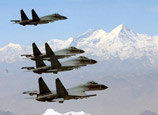
The navy accumulated enough experience to optimize its escort methods. It simplified and diversified procedures, and developed a regular escort schedule, experts said.
The navy is continuing to improve its combat capability by adapting to the pirates' new tactics, said Yang Junfei, commander of the 11th escort fleet and political commissar of the North Sea Fleet.
To address the increasing number of pirate attacks at dawn and dusk, for instance, the fleet, led by Yang, conducted its first day-and-night drill, involving warships and helicopters in the Indian Ocean in March.
Pirates have extended their activities from Somalia and the Gulf of Aden to the western coast of India and Sri Lanka, the Red Sea, the Gulf of Oman and the Mozambique Channel, he said.
They have changed their targets from slow, low merchant vessels to big, high ones carrying coal and oil, said Yang.
"The troops have never stopped training, in order to be ready for any threat," he said.
Efficient methods
Captain Liu from Nanjing Ocean Shipping Co Ltd is one of many who benefited from the Chinese navy's efficient anti-piracy methods.
Liu, with two decades of shipping experience, almost felt "hopeless" when he learned in Nanjing on April 6 that the company's vessel Xianghuamen had been attacked and 28 crew member had been kidnapped by pirates in waters off Iran.
The 11th escort fleet headed to Iran the moment they got the information and actively coordinated with the nearby international naval forces for assistance at the same time.
Ten hours later, all the kidnapped crew members were rescued by the Iranian navy.
















 China sends first oceangoing patrol vessel to South China Sea
China sends first oceangoing patrol vessel to South China Sea


![]()
